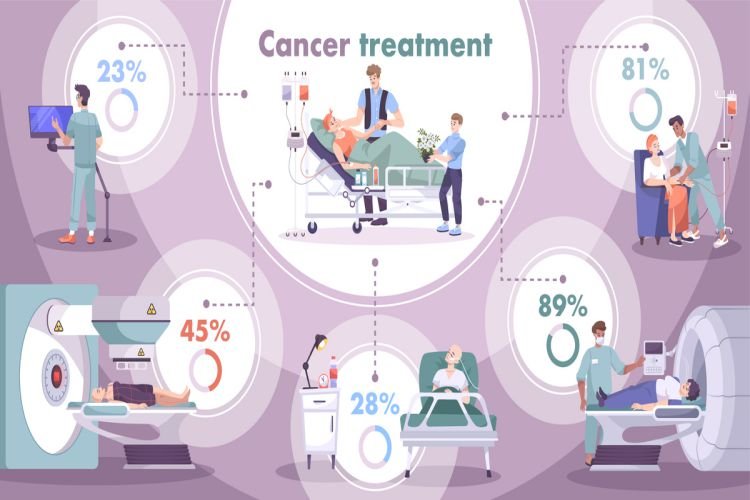 Cancer has been a relentless adversary, affecting millions of lives worldwide. However, in recent years, there has been remarkable progress in the field of cancer therapy. Researchers and medical professionals have tirelessly worked to develop innovative therapies and groundbreaking techniques that are changing the landscape of cancer care. The following article explores the most recent developments in Cancer treatment, highlighting the cutting-edge therapies and strategies that offer hope to patients and their families.
Cancer has been a relentless adversary, affecting millions of lives worldwide. However, in recent years, there has been remarkable progress in the field of cancer therapy. Researchers and medical professionals have tirelessly worked to develop innovative therapies and groundbreaking techniques that are changing the landscape of cancer care. The following article explores the most recent developments in Cancer treatment, highlighting the cutting-edge therapies and strategies that offer hope to patients and their families.
1. Immunotherapy: Unleashing the Power of the Immune System
Immunotherapy has been shown to be revolutionary in the fight against cancer. This revolutionary approach harnesses the body’s own immune system to combat cancer cells. Key advancements in immunotherapy include:
– Checkpoint Inhibitors: These medications, which include nivolumab (Opdivo) and pembrolizumab (Keytruda), block certain proteins that impede immune responses, enabling the immune system to recognize and successfully combat cancer cells.
– CAR-T Cell treatment: In order to target certain cancer antigens, a patient’s T cells are genetically modified as part of chimera antigen receptor T-cell treatment. Blood malignancies have been effectively treated using CAR-T treatments such as Kymriah and Yescarta.
– Personalised Immunotherapy: Tailoring immunotherapy to a patient’s unique genetic makeup is an evolving trend. This approach enhances treatment efficacy and minimizes side effects.
2. Precision Medicine: Targeting Cancer at Its Core
Precision medicine is another breakthrough in cancer therapy that takes into account an individual’s genetic, molecular, and lifestyle factors. Here’s what you need to know:
– Genomic Profiling: Genetic testing, like the geneType risk assessment, helps identify specific mutations or alterations in cancer cells, enabling the identification of more likely to be successfully tailored medicines.
– Liquid Biopsies: These non-invasive tests analyze blood samples for circulating tumor DNA, providing real-time information about a patient’s cancer and treatment response.
– Drug Combinations: Researchers are exploring novel drug combinations that can attack cancer cells at multiple points, reducing the risk of resistance and improving outcomes.
3. Minimally Invasive Surgery: Less Pain, Faster Recovery
– Robotic Surgery: Surgeons can now perform complex cancer surgeries with the assistance of robotic systems, offering greater precision and smaller incisions.
– Laparoscopic Surgery: Minimally invasive laparoscopic procedures have become the standard for many cancer surgeries, resulting in shorter hospital stays and quicker recovery.
4. Radiomics and Artificial Intelligence: Aiding Diagnosis and Treatment
– Early Detection: AI algorithms analyze medical images (MRI, CT scans, etc.) to identify subtle early detection of cancer symptoms and improve the prognosis for patients receiving therapy.
– Treatment Planning: AI helps oncologists develop personalized treatment plans by analyzing vast amounts of patient data and suggesting the most effective therapies.
– Predictive Modeling: AI can predict a patient’s response to a particular treatment, allowing for adjustments in real-time to optimize outcomes.
5. Targeted Therapies: Precision Strikes Against Cancer
– EGFR Inhibitors: Drugs like erlotinib (Tarceva) and osimertinib (Tagrisso) target the epidermal growth factor receptor, which is often overactive in lung cancer.
– HER2-Targeted Therapy: Trastuzumab (Herceptin) and other HER2-targeted drugs have revolutionized breast cancer treatment.
– PARP Inhibitors: These drugs, such as olaparib (Lynparza), are used in patients with BRCA mutations and have shown promise in ovarian and breast cancer.
6. Gene Editing and CRISPR: A Future of Possibilities
CRISPR-Cas9 gene editing technology is opening up exciting possibilities in Cancer treatment options:
– Gene Editing: CRISPR allows researchers to modify genes in cancer cells, potentially disabling their ability to divide and grow.
– Gene Therapy: Scientists are exploring the use of gene therapy to replace faulty genes with healthy ones, a promising approach for certain cancers.
Conclusion
The latest advances in Cancer treatment are bringing new hope to patients and their families. From immunotherapy to precision medicine, minimally invasive surgery, AI-assisted diagnosis, targeted therapies, and gene editing, the arsenal of tools against cancer has never been more robust. As research progresses, more innovative treatments and breakthroughs are needed in the fight against cancer.




